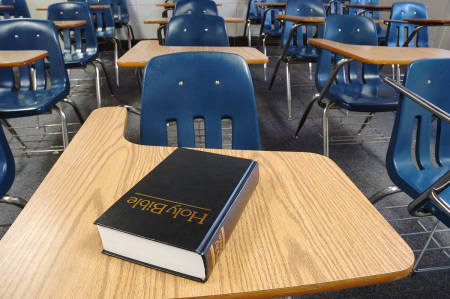10th Circuit rejects appeal from Christian school accused of firing chaplain who addressed racism

A federal appeals court has rejected an appeal from a K-12 Christian school in Colorado accused of wrongfully firing a Bible teacher because he addressed alleged incidents of racism at a student gathering.
In an order released Tuesday, the 10th U.S. Circuit Court of Appeals rejected the petition for rehearing from Faith Bible Christian International, which does business as Faith Christian Academy. The decision allows former chaplain Gregg Tucker to proceed with his lawsuit against the school.
Tucker served as the school's chaplain and Bible teacher, working at the school for over 17 years. In January 2018, he led a chapel service on race that the school believes became too political. The legal team representing the school contends that Tucker handled the ensuing conflict that arose from the service in a way that undermined the trust that parents and the school had in him.
After getting the green light from the Equal Employment Opportunity Commission, Tucker filed a complaint against Faith Christian, accusing the school of violating Title VII of the Civil Rights Act of 1964 and Colorado law. He claims his firing had to do with his decision to talk about incidents of racism during the school assembly.
Seeking to dismiss the lawsuit outright, Faith Christian cited ministerial exception — a legal principle giving faith-based organizations the right to make hiring decisions for ministerial positions in accordance with their faith — in justifying Tucker's firing. But the district court rejected the school's claim for summary judgment on the issue.
In June, a three-judge panel of the 10th Circuit ruled 2-1 to uphold the lower court decision and rejected Faith Christian's request for an immediate appeal.
The school requested a rehearing before the full appeals court, which was turned down.
Circuit Judge David Milton Ebel, a Reagan appointee, authored a separate concurrence supporting the denial, saying that "denying Faith Christian an immediate appeal is consistent with well-established lines of Supreme Court precedent and does not create any circuit split."
"Furthermore, the Second Circuit, in addressing the separate but related affirmative church autonomy defense, recently reached the same conclusion as our panel, holding that a religious employer was not entitled to an immediate collateral-order appeal from the denial of a motion to dismiss based on that defense," wrote Ebel.
"[T]here will be no judicial 'meddling' with religion if a fact-finder ultimately determines that Tucker is not a minister, because religious employers are amenable to employment discrimination claims brought by non-ministerial employees. That is the factual question still to be determined in our case."
Judge Robert Edwin Bacharach, an Obama appointee, dissented, arguing that the rehearing rejection "reflects a fundamental misconception of the ministerial exception."
"Though most defenses protect only against liability, the ministerial exception protects a religious body from the suit itself. Without that protection, religious bodies will inevitably incur protracted litigation over matters of religion," Bacharach wrote.
"The stakes are exceptionally important for religious bodies deciding whom to hire or fire. These stakes arise from the structural role of the ministerial exception in limiting governmental power over religious matters."
Faith Christian Superintendent Andrew Hasz stated in a letter sent to the community in February 2018 that the dismissal was mutually agreed on and that race was not a factor in the firing.
"Through multiple discussions with Mr. Tucker it was clear that we have many similar goals and values, especially the deep conviction we share that everyone is created in the image of God and there is no place for racism within our community," wrote Hasz.
"This issue was not a factor in the decision. We do, however, have some ongoing differences which have nothing to do with the topic of race or equality."
However, Tucker has argued that the separation was not mutual and that his service on race and equality did play a role in his firing.
"How the administration has handled the issue of racism, which was the primary impetus for me facilitating the chapel in January, was and is the fundamental point of contention," Tucker said in a local media interview in 2018.
The religious freedom legal nonprofit Becket represents the school, which contends that religious institutions have the right to hire leaders that share their religious mission. The group argues that ministerial exceptions keep the government from influencing religious institutions.
"The panel's ruling directly conflicts with rulings from the Supreme Court and numerous other federal appeals courts," a Becket statement reads. "A diverse coalition of minority faith groups, religious school organizations representing thousands of schools, leading legal academics, and sixteen states filed briefs supporting Faith Bible."





















